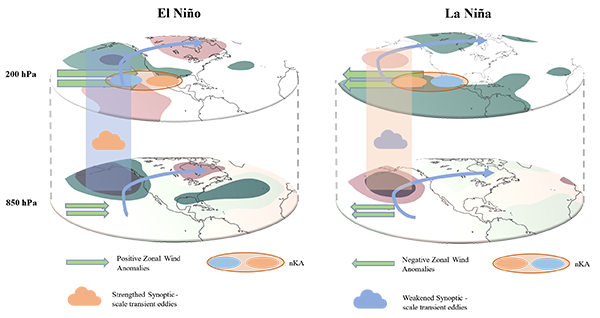中国科学院大气物理研究所大气科学和地球流体力学数值模拟国家重点实验室
State Key Laboratory of Numerical Modeling for Atmospheric Sciences and
Geophysical Fluid Dynamics (LASG)
Institute of Atmospheric Physics, Chinese Academy of Sciences
State Key Laboratory of Numerical Modeling for Atmospheric Sciences and
Geophysical Fluid Dynamics (LASG)
Institute of Atmospheric Physics, Chinese Academy of Sciences

Vol.19/No.19 December 2023
GRL: Unlocking the Complexity of ENSO Teleconnections through Nonlinear Energy Insights

Schematic representation of nonlinear energy advection and weather-scale eddy impact on ENSO teleconnections (Image by WANG Ya)
ENSO, a prominent climate phenomenon, has long been studied for its impact on global weather patterns. However, traditional linear energy conversion theories sometimes fall short in explaining real-world observations.
Dr. Gang Huang states: "Our research reveals that nonlinear energy processes play a crucial role in shaping the zonal asymmetry observed in ENSO-induced PNA wave patterns. This challenges traditional linear frameworks and underscores the need to consider nonlinear energy processes in climate research."
This study reveals that ENSO triggers a complex interplay of zonally symmetric and asymmetric responses within the atmosphere, ultimately affecting the positioning of PNA teleconnections. These findings emphasize the need to consider nonlinear energy processes in climate research.
Dr. Kaiming Hu adds: "The nonlinear energy advection processes we've uncovered drive contrasting energy advection modes during El Nino and La Nina events, leading to variations in the zonal position of the PNA pattern. This research enhances our understanding of how ENSO events impact weather patterns and climate systems."
The team's findings have been successfully reproduced and confirmed in model experiments of varying complexity, reinforcing the significance of nonlinear energy processes in shaping ENSO-induced teleconnections.
This research sheds new light on the intricate mechanisms at play in ENSO-induced teleconnections, enhancing our understanding of how ENSO events impact weather patterns and climate systems.
Citation: Wang, Y., Hu, K., Huang, G., & Tao, W. (2023). The role of nonlinear energy advection in forming asymmetric structure of ENSO teleconnections over the North Pacific and North America. Geophysical Research Letters, 50, e2023GL105277. https://doi.org/10.1029/2023GL105277
Link: https://agupubs.onlinelibrary.wiley.com/doi/10.1029/2023GL105277
Contact: HUANG Gang,hg@mail.iap.ac.cn; Hu Kaiming, hkm@mail.iap.ac.cn
Add: No.40, Huayanli, Beichen West Road, Chaoyang District, Beijing P.O. Box 9804, 100029, China
E-mail: lasg_newsletter@lasg.iap.ac.cn
Editors: Chuanyi Wang (wangcy@lasg.iap.ac.cn), Kangjun Chen(ckj@lasg.iap.ac.cn)
E-mail: lasg_newsletter@lasg.iap.ac.cn
Editors: Chuanyi Wang (wangcy@lasg.iap.ac.cn), Kangjun Chen(ckj@lasg.iap.ac.cn)